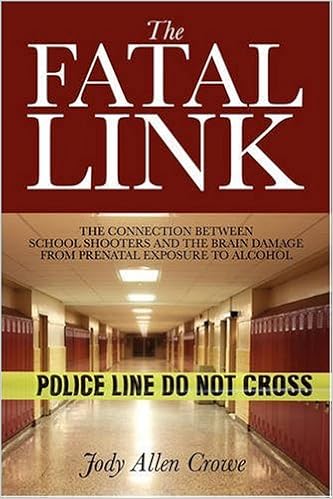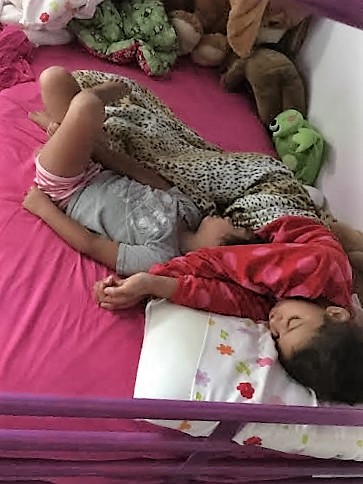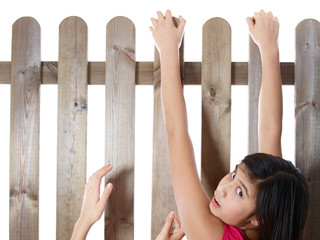About 6 years ago, I found a book entitled, Dandelion On My Pillow, Butcher Knife Beneath, by Nancy Thomas, and I suddenly grasped the magnitude of of Reactive Attachment Disorder. We had never heard of RAD before we began searching for an answer to B's problems. In reality we were trying to figure out if something was wrong with B or if we were perhaps mentally unstable. Which, I must add, is a very scary situation to be in! When I discovered Nancy's book, I finally understood, and as I didn't enjoy having people imply that perhaps I was simply being over dramatic, I shared the book.
Needless to say we received quite the responses! Anything from, "I don't know what to say," to, "Make sure your children never see that book!" Looking back I can laugh, but at the time it wasn't funny.
You may wonder why I even shared the book and my answer to that is, in our circle of family, friends and so on, we were among the very first to implement some of the "odd parenting technique's that apply to those parenting a child with RAD." Keeping B with us, not allowing him to interact with people unless we were right beside him to monitor the situation, keeping him back from events that overstimulated him and insisting that no one other than mom or dad feed him, didn't always go over so well and our hope was that this book would allow people to see that we weren't being vindictive by not allowing them to spend time alone with B, we were protecting all parties involved.
Another response was, "You are taking the worst case scenario's and act as though B will turn out like them." At that time B was a little charmer in public. He was sweet and compliant most times, if he wasn't, he manipulated the situation to make it appear as if mom and dad were being unreasonable. The people looking on had no experience with attachment disorders and couldn't believe a preschooler would have the mental capacity to make mom or dad look bad, besides why would a child do such a thing? The book I am about to share with you may make you think the same thing. But I want you to understand that sometimes when you look ahead and seeing what could happen, you have the incentive to be as pro active as possible now and maybe, just maybe, you will save both you and your child a lot of heart ache in the future.

I think I have found the FASD equivalent to Dandelion On My Pillow, Butcher Knife Beneath. It is called The Fatal Link. The author reveals the one link that is present in the shootings that happened over the years in Minnesota schools. Jody Allen Crowe taught at a school where many of the students were from a nearby Reservation, and came to realize that punishment/consequences did no good. "I would punish a student, he would cry and beg forgiveness, promising never to repeat the offense and the next day he would do the very same thing! It was so frustrating!"
I will admit I had to smile because that sounds so familiar. This teacher began connecting the dots and realized alcohol was the culprit. He shares stories of family members affected by alcohol and says in part, "I want people to realize that FASD affects every walk of people, it is everywhere and I believe it is one of the main reason's our jails and Social Services are so overwhelmed. We have a generation of mothers who are affected and quite likely their children will also be affected. FASD is not hereditary, but the lives many people with this disability lead due to their inability to rise above their circumstances, contribute to generation after generation of people affected with FASD."
I got the book yesterday and by bed time I was finished. I thought I understood FASD, but this book did an excellent job of explaining the many ways people can be affected as well as giving examples of situations the author faced. Maybe I liked the book so much simply because I know the author felt the same sense of helpless frustration I sometimes feel when Joseph simply cannot grasp what I consider a simple concept.
"The only advice I can give is STRUCTURE, STRUCTURE, STRUCTURE," writes the author, Jody Allen Crowe. Of course there are many other things you can do to help those affected with FASD but that isn't what this book was about, rather it was written so parents, doctors, law enforcement and those operating the prison systems would ask, "Why did this person do this," and look at their history, you may find prenatal exposure to alcohol is the common denominator."
I urge you to read this book for yourself, it contains a wealth of information and maybe it will help you better understand your impulsive, dramatic, immature child.
Like my FB page Tales From Our House Blog to receive new posts as well as see the links I share on RAD, FASD, adoption and parenting.
Needless to say we received quite the responses! Anything from, "I don't know what to say," to, "Make sure your children never see that book!" Looking back I can laugh, but at the time it wasn't funny.
You may wonder why I even shared the book and my answer to that is, in our circle of family, friends and so on, we were among the very first to implement some of the "odd parenting technique's that apply to those parenting a child with RAD." Keeping B with us, not allowing him to interact with people unless we were right beside him to monitor the situation, keeping him back from events that overstimulated him and insisting that no one other than mom or dad feed him, didn't always go over so well and our hope was that this book would allow people to see that we weren't being vindictive by not allowing them to spend time alone with B, we were protecting all parties involved.
Another response was, "You are taking the worst case scenario's and act as though B will turn out like them." At that time B was a little charmer in public. He was sweet and compliant most times, if he wasn't, he manipulated the situation to make it appear as if mom and dad were being unreasonable. The people looking on had no experience with attachment disorders and couldn't believe a preschooler would have the mental capacity to make mom or dad look bad, besides why would a child do such a thing? The book I am about to share with you may make you think the same thing. But I want you to understand that sometimes when you look ahead and seeing what could happen, you have the incentive to be as pro active as possible now and maybe, just maybe, you will save both you and your child a lot of heart ache in the future.

I think I have found the FASD equivalent to Dandelion On My Pillow, Butcher Knife Beneath. It is called The Fatal Link. The author reveals the one link that is present in the shootings that happened over the years in Minnesota schools. Jody Allen Crowe taught at a school where many of the students were from a nearby Reservation, and came to realize that punishment/consequences did no good. "I would punish a student, he would cry and beg forgiveness, promising never to repeat the offense and the next day he would do the very same thing! It was so frustrating!"
I will admit I had to smile because that sounds so familiar. This teacher began connecting the dots and realized alcohol was the culprit. He shares stories of family members affected by alcohol and says in part, "I want people to realize that FASD affects every walk of people, it is everywhere and I believe it is one of the main reason's our jails and Social Services are so overwhelmed. We have a generation of mothers who are affected and quite likely their children will also be affected. FASD is not hereditary, but the lives many people with this disability lead due to their inability to rise above their circumstances, contribute to generation after generation of people affected with FASD."
I got the book yesterday and by bed time I was finished. I thought I understood FASD, but this book did an excellent job of explaining the many ways people can be affected as well as giving examples of situations the author faced. Maybe I liked the book so much simply because I know the author felt the same sense of helpless frustration I sometimes feel when Joseph simply cannot grasp what I consider a simple concept.
"The only advice I can give is STRUCTURE, STRUCTURE, STRUCTURE," writes the author, Jody Allen Crowe. Of course there are many other things you can do to help those affected with FASD but that isn't what this book was about, rather it was written so parents, doctors, law enforcement and those operating the prison systems would ask, "Why did this person do this," and look at their history, you may find prenatal exposure to alcohol is the common denominator."
I urge you to read this book for yourself, it contains a wealth of information and maybe it will help you better understand your impulsive, dramatic, immature child.
Like my FB page Tales From Our House Blog to receive new posts as well as see the links I share on RAD, FASD, adoption and parenting.




















